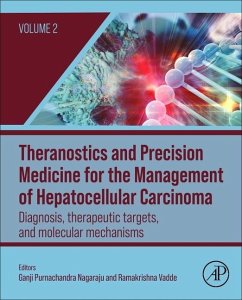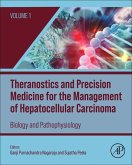Theranostics and Precision Medicine for the Management of Hepatocellular Carcinoma, Volume 2
Diagnosis, Therapeutic Targets, and Molecular Mechanisms
Herausgeber: Nagaraju, Ganji Purnachandra; Vadde, Ramakrishna
Theranostics and Precision Medicine for the Management of Hepatocellular Carcinoma, Volume 2
Diagnosis, Therapeutic Targets, and Molecular Mechanisms
Herausgeber: Nagaraju, Ganji Purnachandra; Vadde, Ramakrishna
- Gebundenes Buch
- Merkliste
- Auf die Merkliste
- Bewerten Bewerten
- Teilen
- Produkt teilen
- Produkterinnerung
- Produkterinnerung
Description based on volume 2, published 2022.
Andere Kunden interessierten sich auch für
![Theranostics and Precision Medicine for the Management of Hepatocellular Carcinoma, Volume 1 Theranostics and Precision Medicine for the Management of Hepatocellular Carcinoma, Volume 1]() Theranostics and Precision Medicine for the Management of Hepatocellular Carcinoma, Volume 1177,99 €
Theranostics and Precision Medicine for the Management of Hepatocellular Carcinoma, Volume 1177,99 €![Consciousness and the Brain Consciousness and the Brain]() Stanislas DehaeneConsciousness and the Brain20,99 €
Stanislas DehaeneConsciousness and the Brain20,99 €![Cognitive Behavior Interventions for Self-Defeating Thoughts Cognitive Behavior Interventions for Self-Defeating Thoughts]() Elliot D CohenCognitive Behavior Interventions for Self-Defeating Thoughts191,99 €
Elliot D CohenCognitive Behavior Interventions for Self-Defeating Thoughts191,99 €![Pathologies of Awareness: Bridging the Gap Between Theory and Practice Pathologies of Awareness: Bridging the Gap Between Theory and Practice]() Pathologies of Awareness: Bridging the Gap Between Theory and Practice129,99 €
Pathologies of Awareness: Bridging the Gap Between Theory and Practice129,99 €![Cognitive Science Cognitive Science]() Ramesh Kumar MishraCognitive Science174,99 €
Ramesh Kumar MishraCognitive Science174,99 €![Rehabilitation of Visual Disorders After Brain Injury Rehabilitation of Visual Disorders After Brain Injury]() Josef ZihlRehabilitation of Visual Disorders After Brain Injury57,99 €
Josef ZihlRehabilitation of Visual Disorders After Brain Injury57,99 €![The Invisible Brain Injury The Invisible Brain Injury]() Aurora Lassaletta AtienzaThe Invisible Brain Injury180,99 €
Aurora Lassaletta AtienzaThe Invisible Brain Injury180,99 €-
-
-
Description based on volume 2, published 2022.
Hinweis: Dieser Artikel kann nur an eine deutsche Lieferadresse ausgeliefert werden.
Hinweis: Dieser Artikel kann nur an eine deutsche Lieferadresse ausgeliefert werden.
Produktdetails
- Produktdetails
- Verlag: Elsevier Inc
- Seitenzahl: 398
- Erscheinungstermin: 1. April 2022
- Englisch
- Abmessung: 235mm x 191mm x 22mm
- Gewicht: 894g
- ISBN-13: 9780323988070
- ISBN-10: 0323988075
- Artikelnr.: 62535652
- Herstellerkennzeichnung
- Libri GmbH
- Europaallee 1
- 36244 Bad Hersfeld
- 06621 890
- Verlag: Elsevier Inc
- Seitenzahl: 398
- Erscheinungstermin: 1. April 2022
- Englisch
- Abmessung: 235mm x 191mm x 22mm
- Gewicht: 894g
- ISBN-13: 9780323988070
- ISBN-10: 0323988075
- Artikelnr.: 62535652
- Herstellerkennzeichnung
- Libri GmbH
- Europaallee 1
- 36244 Bad Hersfeld
- 06621 890
1. Hepatocellular carcinoma diagnosis2. Computational analysis of
prognosisrelated genes in liver cancer3. Computational approaches to
identify biomarkers, enzymes, and pathways of hepatocellular carcinoma4.
Ribonucleic acid sequence analysis in deciphering hepatocellular
carcinoma5. Hepatocarcinogenesis and the role of next-generation sequencing
in liver cancer6. Liver cancer: the tumor microenvironment and associated
pathways7. Metabolic pathway-based target therapy to hepatocellular
carcinoma: a computational approach8. Targeting ion channels in hepatic
cancer9. Tyrosine kinases: their role in hepatocellular carcinoma10. Role
of transcription factors in hepatocellular carcinoma11. Modulatory act of
diverse transcriptional factors in liver carcinoma12. Association of
specificity protein 1 with hepatocellular carcinoma13. Promising biomarkers
for liver cancer14. Molecular signaling and its role in drug resistance in
hepatocellular carcinomas15. Multidrug resistance, a major obstacle in
hepatocellular carcinoma treatment: challenges and future perspectives16.
Proliferative signaling pathways in hepatocellular carcinoma17. Targeting
angiogenesis in hepatocellular carcinoma18. Conventional and novel
biomarkers for the diagnosis and prognosis of liver cancer19. Updates on
the staging and treatment of hepatocellular carcinoma20. ROS-mediated
pathways: potential role in hepatocellular carcinoma biology and therapy21.
Dysregulated cell-signaling pathways in hepatocellular carcinoma: causes
and therapeutic options22. LKB1/STK11-mediated signal transduction in
hepatocellular carcinoma
prognosisrelated genes in liver cancer3. Computational approaches to
identify biomarkers, enzymes, and pathways of hepatocellular carcinoma4.
Ribonucleic acid sequence analysis in deciphering hepatocellular
carcinoma5. Hepatocarcinogenesis and the role of next-generation sequencing
in liver cancer6. Liver cancer: the tumor microenvironment and associated
pathways7. Metabolic pathway-based target therapy to hepatocellular
carcinoma: a computational approach8. Targeting ion channels in hepatic
cancer9. Tyrosine kinases: their role in hepatocellular carcinoma10. Role
of transcription factors in hepatocellular carcinoma11. Modulatory act of
diverse transcriptional factors in liver carcinoma12. Association of
specificity protein 1 with hepatocellular carcinoma13. Promising biomarkers
for liver cancer14. Molecular signaling and its role in drug resistance in
hepatocellular carcinomas15. Multidrug resistance, a major obstacle in
hepatocellular carcinoma treatment: challenges and future perspectives16.
Proliferative signaling pathways in hepatocellular carcinoma17. Targeting
angiogenesis in hepatocellular carcinoma18. Conventional and novel
biomarkers for the diagnosis and prognosis of liver cancer19. Updates on
the staging and treatment of hepatocellular carcinoma20. ROS-mediated
pathways: potential role in hepatocellular carcinoma biology and therapy21.
Dysregulated cell-signaling pathways in hepatocellular carcinoma: causes
and therapeutic options22. LKB1/STK11-mediated signal transduction in
hepatocellular carcinoma
1. Hepatocellular carcinoma diagnosis2. Computational analysis of
prognosisrelated genes in liver cancer3. Computational approaches to
identify biomarkers, enzymes, and pathways of hepatocellular carcinoma4.
Ribonucleic acid sequence analysis in deciphering hepatocellular
carcinoma5. Hepatocarcinogenesis and the role of next-generation sequencing
in liver cancer6. Liver cancer: the tumor microenvironment and associated
pathways7. Metabolic pathway-based target therapy to hepatocellular
carcinoma: a computational approach8. Targeting ion channels in hepatic
cancer9. Tyrosine kinases: their role in hepatocellular carcinoma10. Role
of transcription factors in hepatocellular carcinoma11. Modulatory act of
diverse transcriptional factors in liver carcinoma12. Association of
specificity protein 1 with hepatocellular carcinoma13. Promising biomarkers
for liver cancer14. Molecular signaling and its role in drug resistance in
hepatocellular carcinomas15. Multidrug resistance, a major obstacle in
hepatocellular carcinoma treatment: challenges and future perspectives16.
Proliferative signaling pathways in hepatocellular carcinoma17. Targeting
angiogenesis in hepatocellular carcinoma18. Conventional and novel
biomarkers for the diagnosis and prognosis of liver cancer19. Updates on
the staging and treatment of hepatocellular carcinoma20. ROS-mediated
pathways: potential role in hepatocellular carcinoma biology and therapy21.
Dysregulated cell-signaling pathways in hepatocellular carcinoma: causes
and therapeutic options22. LKB1/STK11-mediated signal transduction in
hepatocellular carcinoma
prognosisrelated genes in liver cancer3. Computational approaches to
identify biomarkers, enzymes, and pathways of hepatocellular carcinoma4.
Ribonucleic acid sequence analysis in deciphering hepatocellular
carcinoma5. Hepatocarcinogenesis and the role of next-generation sequencing
in liver cancer6. Liver cancer: the tumor microenvironment and associated
pathways7. Metabolic pathway-based target therapy to hepatocellular
carcinoma: a computational approach8. Targeting ion channels in hepatic
cancer9. Tyrosine kinases: their role in hepatocellular carcinoma10. Role
of transcription factors in hepatocellular carcinoma11. Modulatory act of
diverse transcriptional factors in liver carcinoma12. Association of
specificity protein 1 with hepatocellular carcinoma13. Promising biomarkers
for liver cancer14. Molecular signaling and its role in drug resistance in
hepatocellular carcinomas15. Multidrug resistance, a major obstacle in
hepatocellular carcinoma treatment: challenges and future perspectives16.
Proliferative signaling pathways in hepatocellular carcinoma17. Targeting
angiogenesis in hepatocellular carcinoma18. Conventional and novel
biomarkers for the diagnosis and prognosis of liver cancer19. Updates on
the staging and treatment of hepatocellular carcinoma20. ROS-mediated
pathways: potential role in hepatocellular carcinoma biology and therapy21.
Dysregulated cell-signaling pathways in hepatocellular carcinoma: causes
and therapeutic options22. LKB1/STK11-mediated signal transduction in
hepatocellular carcinoma








